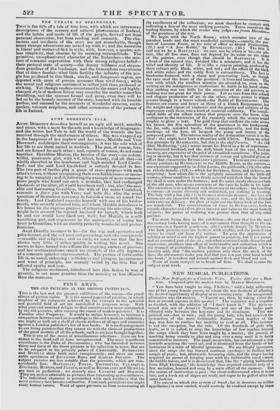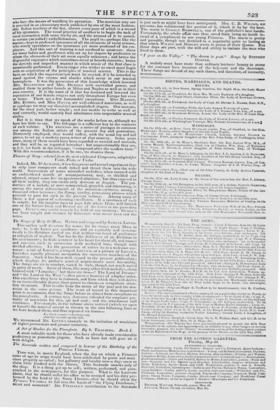NEW MUSICAL PUBLICATIONS.
Twelve New Solliwgii fw a Contralto Voice. Twelve ditto for a Bari- tune. Composed after the mudern taste by AlAtieo BORDOGNI.
"You have been taught to sing, I believe," said a lady, addressing one of her young female guests' to whom she was desirous of affording the desired opportunity of display main evening party. An unequivocal affirmative was the answer. " Favour me, then, by taking either the first or second soprano in this quartet." The rejoinder was a negative its decided, with the addition of " I don't know it." The piece se- lected was one of Amu's Notturni, and one of the treble pants vibrated only between the key-note and its dominant. This was pointed out—but in vain ; and the young lady, who had received the instruction of the most fashionable Italian vocal teacher of the day, was fain to confess her inability to read at all. This instance is not the exception but the rule. Of the hundreds of girls who learn, as it is called, to sing, the knowledge of few reaches beyond the songs which they have been taught by a master; the process of teaching being usually to play and sing over a song until it is fairly committed to memory. The pupil, meanwhile has not advanced a step towards acquiring the vocal art, and is dismissed from the hands of her instructor in a state of blissful ignorance. We say blissful ignorance, since the songs she has learned continue (perhaps) in fashion for a couple of years ; but, afterwards becoming stale, and the singer having acquired no power of keeping pace with the fashionable vocal career,
the bubble bursts, and it is discovered that, like the "piping bullfinches from Iligh Germany," the knowledge thus acquired consists only of a few melodies, learned and sung by a mere effort of the memory. But the season of instruction is past : the cheat is discovered when it is too late, and a fresh set of dupes are ready and eager to be gulled after the same fashion.
The extent to which this system of fraud (for it deserves no milder appellation) is now carried, would scarcely be credited except by those alio have the means of watching its operation. The musician may see it unveiled in an elementary work published by one of the most fashion- able Italian teachers of the day, almost every page of which is a record .4)f* his ignorance. The usual practice of another is to begin the task of vocal instruction with some trashy air, and the amount of it to pencil. in certain (so-called) embellishments. The pupil is-perhaps like the master-kept in profound ignorance of all the elements of vocal science, who wisely speculates on the Ignorance yet more profound of his em- ployers. And this sort of training is not confined to amateurs : there are many ladies and gentlemen who set up for singers by profession to whom the elements of their art seem equally unknown ; and hence the disgraceful exposures which sometimes occur at benefit concerts ; hence the slovenly and imperfect manner in which music of the first class is occasionally performed. Every singer who wishes to excel must begin with an acquisition of the principles of musical science. This is the basis on which the superstructure must be erected, if it be intended to stand against the storms and shocks which occur in our musical hemisphere. It was the possession of this knowledge which invested Mrs. 130.1.INGT0N and :1Irs. DICKONS with unrivalled power, and enabled them to gather laurels at Milan and Naples us well as in their own country. It is the want of it that has lessened and lowered the reputation of our female singers not only throughout Europe but even at home. There are a few honourable exceptions. Miss MASSON, Mrs. Bisnor, and Miss Hawes, are well-educated musicians, as well as (perhaps we may say therefore) accomplished singers. Our men are, for the most part, better taught ; and one unable to write as well as read correctly, would scarcely find admittance into respectable musical
circles.
But it is time that we speak of the works before us, although we have but little to say. The titlepage is a sufficient key to the contents of each volume. The exercises are a series of passages in common use among the Italian artists of the present day and generation. Dextrously employed, they would suffise, with the usual top and tail pieces, to set up u moderns opera. writer of that country. Some years since, many of them would have been regarded as unvocal and uncouth, and they will be so regarded hereafter : but unquestionably they are, as it is set forth in the titlepege, "composed after the modern taste." With this recommendation, if it be one, we dismiss them,



























 Previous page
Previous page